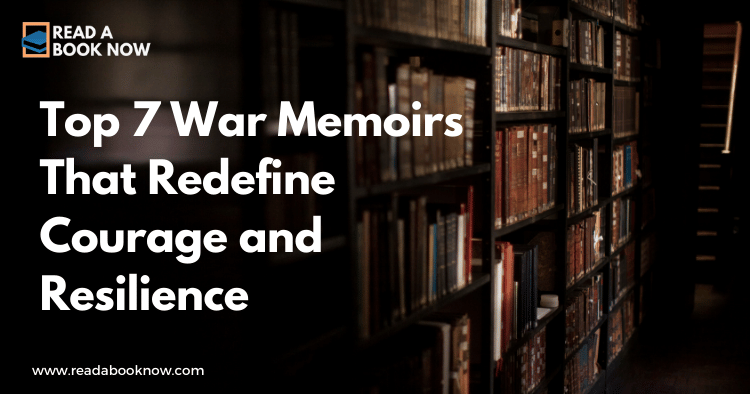Table of Contents
- Introduction
- 1. “A Long Way Gone” by Ishmael Beah
- 2. “The Things They Carried” by Tim O’Brien
- 3. “Unbroken” by Laura Hillenbrand
- 4. “Night” by Elie Wiesel
- 5. “The Good Soldier Schweik” by Jaroslav Hašek
- 6. “With the Old Breed” by E.B. Sledge
- 7. “The Book Thief” by Markus Zusak
- Conclusion
- FAQs
Introduction
War has a profound impact on those who experience it, and the stories told through war memoirs often reveal the true depths of human courage and resilience. These books serve not only as historical accounts but also as powerful narratives that inspire readers to reflect on the human spirit. In this article, we will explore seven war memoirs that redefine courage and resilience, offering insights into the lives of those who faced unimaginable challenges yet emerged with their spirits intact.
“War does not determine who is right — only who is left.” — Bertrand Russell
1. “A Long Way Gone” by Ishmael Beah
Ishmael Beah’s memoir, A Long Way Gone, chronicles his harrowing experiences as a child soldier in Sierra Leone during the civil war. Beah was only twelve years old when he was forcibly recruited, and his story captures the brutal realities of war through the eyes of a child.
Key Themes:
- Loss of Innocence: Beah’s journey illustrates how war strips away childhood and innocence.
- Survival and Redemption: Despite the horrors he faced, Beah ultimately finds a way to reclaim his life and voice.
This memoir is not just a tale of survival; it’s a testament to the resilience of the human spirit. Ishmael Beah now advocates for peace and reconciliation, using his story to inspire change. For more on his advocacy work, visit Ishmael Beah’s Official Website.
“Even in the darkest times, we can find our way back to the light.” — Ishmael Beah
2. “The Things They Carried” by Tim O’Brien
Tim O’Brien’s The Things They Carried is a poignant collection of linked short stories about soldiers in the Vietnam War. The title refers to the physical and emotional burdens that the soldiers bear, symbolizing the complexity of their experiences.
Key Themes:
- Memory and Trauma: O’Brien explores how memory shapes our understanding of trauma and courage.
- The Weight of War: The narrative illustrates not just the physical weights the soldiers carry, but also their fears, guilt, and the emotional scars left behind.
O’Brien’s lyrical prose has resonated with readers, making this one of the most significant works about the Vietnam War. For an in-depth analysis, check out The Vietnam War Commemoration.
“Stories can save us, can give us hope when everything seems lost.” — Tim O’Brien
3. “Unbroken” by Laura Hillenbrand
Unbroken tells the incredible story of Louis Zamperini, an Olympic athlete and WWII bombardier who survived a plane crash, drifted at sea for weeks, and endured the brutality of a Japanese POW camp.
Key Themes:
- Endurance: Zamperini’s tale exemplifies the power of perseverance and the will to survive.
- Forgiveness: After the war, Zamperini grapples with his traumatic experiences but ultimately finds peace through forgiveness.
Laura Hillenbrand’s meticulous research and storytelling bring Zamperini’s story to life, making it both inspiring and relatable. Dive deeper into his journey at Louis Zamperini Foundation.
“To be unbroken is not simply to endure but to find a way to rise above.” — Laura Hillenbrand
4. “Night” by Elie Wiesel
In Night, Elie Wiesel recounts his harrowing experiences during the Holocaust, capturing the loss of faith, family, and humanity. Wiesel, a Jewish teenager, was deported to Auschwitz and later to Buchenwald.
Key Themes:
- Faith and Doubt: Wiesel’s struggle with his faith amidst the horrors of the Holocaust provides deep philosophical reflections.
- The Human Capacity for Evil: The memoir serves as a stark reminder of the depths of human cruelty.
Wiesel’s work has become a critical part of Holocaust literature, fostering understanding and remembrance. For more information about the Holocaust, visit Yad Vashem.
“To forget the dead would be akin to killing them a second time.” — Elie Wiesel
5. “The Good Soldier Schweik” by Jaroslav Hašek
A satirical novel set during World War I, The Good Soldier Schweik follows the misadventures of a soldier who feigns incompetence to navigate the absurdity of war. While technically a novel, its autobiographical elements and social commentary provide valuable insights into the resilience of the human spirit in the face of bureaucracy and conflict.
Key Themes:
- Absurdity of War: Hašek’s humor highlights the ridiculousness of military life and the absurdity of war.
- Resistance through Humor: The protagonist’s antics serve as a form of resistance against the dehumanizing aspects of war.
This work remains a classic, celebrated for its unique perspective on the impact of war. For more, explore The World War I Museum and Memorial.
“Humor is a way of holding onto our sanity in the face of madness.” — Jaroslav Hašek
6. “With the Old Breed” by E.B. Sledge
E.B. Sledge’s With the Old Breed provides a visceral account of the brutal combat experienced by Marines in the Pacific Theater during World War II. Sledge’s memoir is notable for its unflinching honesty and emotional depth.
Key Themes:
- The Harsh Realities of War: Sledge’s narrative does not shy away from the grim realities of combat.
- Brotherhood and Camaraderie: Throughout the chaos, Sledge emphasizes the bonds formed between soldiers.
Sledge’s memoir has been lauded for its authenticity and has influenced many depictions of war in popular culture. To learn more about his life and legacy, visit The National WWII Museum.
“In war, there are no unwounded soldiers.” — E.B. Sledge
7. “The Book Thief” by Markus Zusak
Although The Book Thief is a work of fiction, it offers a profound exploration of life during World War II through the eyes of a young girl, Liesel Meminger. Narrated by Death, the story highlights the power of words and storytelling amidst chaos.
Key Themes:
- The Power of Literature: The book emphasizes how stories can provide hope and resilience during the darkest times.
- Humanity in Adversity: Zusak’s characters showcase kindness and courage in the face of overwhelming evil.
This novel resonates deeply with readers and serves as a poignant reminder of the impact of war on everyday lives. For further insights, check out The Holocaust Educational Trust.
“Words are the most powerful weapons we have, capable of both great good and great evil.” — Markus Zusak
Conclusion
These seven war memoirs illuminate themes of courage and resilience, showcasing the indomitable human spirit in the face of adversity. Each author has uniquely captured their experiences, providing readers with a deeper understanding of the complexities of war. Through their stories, we are reminded of the strength it takes to endure and the importance of sharing these narratives for future generations.
“In the end, it is not the years in your life that count, but the life in your years.” — Abraham Lincoln
FAQs
What makes a war memoir powerful?
A powerful war memoir often combines personal experience with broader historical context, emotional honesty, and reflections on humanity.
How do war memoirs differ from historical accounts?
While historical accounts focus on factual events, war memoirs provide personal perspectives, emotions, and subjective experiences, allowing readers to connect on a human level.
Can reading war memoirs help in understanding current conflicts?
Absolutely. War memoirs provide insights into the human experiences of conflict, which can foster empathy and a deeper understanding of the complexities of war.




